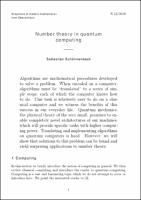| dc.contributor.author | Schönnenbeck, Sebastian | |
| dc.contributor.editor | Bruschi, David Edward | |
| dc.contributor.editor | Cederbaum, Carla | |
| dc.date.accessioned | 2018-08-08T09:09:59Z | |
| dc.date.available | 2018-08-08T09:09:59Z | |
| dc.date.issued | 2018-08-07 | |
| dc.identifier.uri | http://publications.mfo.de/handle/mfo/1380 | |
| dc.description.abstract | Algorithms are mathematical procedures developed
to solve a problem. When encoded on a computer,
algorithms must be "translated" to a series of simple
steps, each of which the computer knows how
to do. This task is relatively easy to do on a classical
computer and we witness the benefits of this
success in our everyday life. Quantum mechanics,
the physical theory of the very small, promises to enable
completely novel architectures of our machines,
which will provide specific tasks with higher computing
power. Translating and implementing algorithms
on quantum computers is hard. However, we will
show that solutions to this problem can be found and
yield surprising applications to number theory. | en_US |
| dc.language.iso | en | en_US |
| dc.publisher | Mathematisches Forschungsinstitut Oberwolfach | en_US |
| dc.relation.ispartofseries | Snapshots of modern mathematics from Oberwolfach;2018,12 | |
| dc.rights | Attribution-ShareAlike 4.0 International | * |
| dc.rights.uri | http://creativecommons.org/licenses/by-sa/4.0/ | * |
| dc.title | Number theory in quantum computing | en_US |
| dc.type | Article | en_US |
| dc.identifier.doi | 10.14760/SNAP-2018-012-EN | |
| local.series.id | SNAP-2018-012-EN | en_US |
| local.subject.snapshot | Algebra and Number Theory | en_US |
| dc.identifier.urn | urn:nbn:de:101:1-2018082110531932128918 | |
| dc.identifier.ppn | 1655290916 | |


